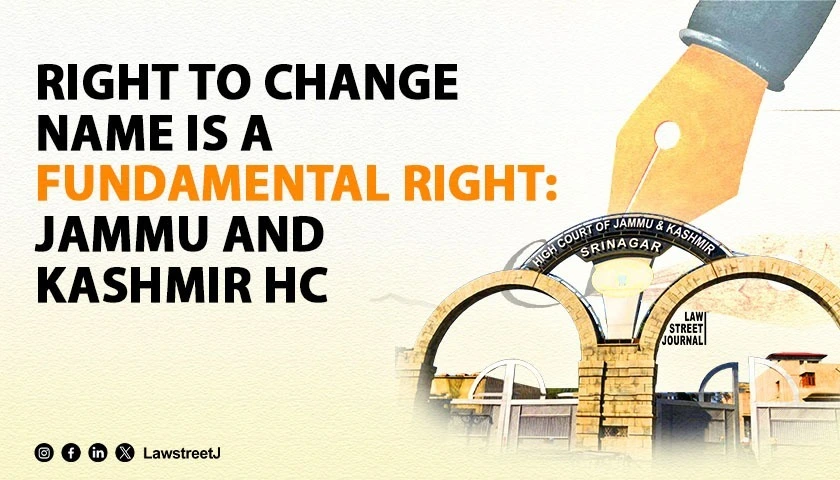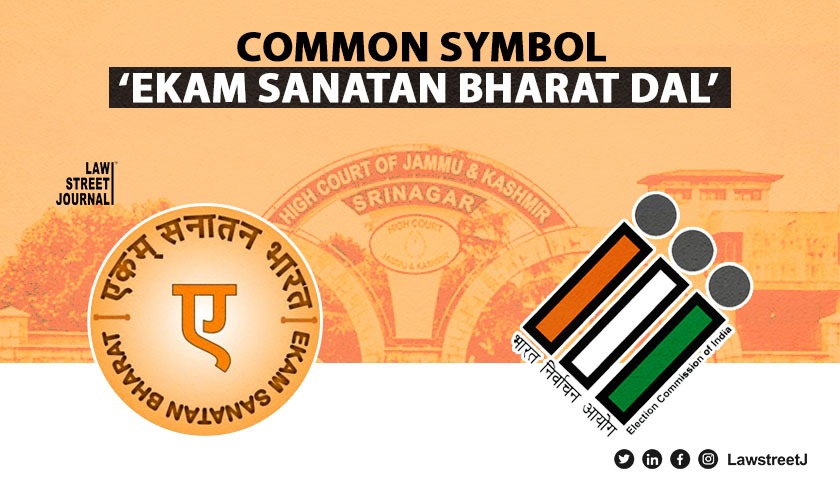Jammu: The High Court of Jammu and Kashmir and Ladakh has held that the right to change one’s name is a fundamental right under Articles 19(1)(a) and 21 of the Constitution, while quashing the School Education Board’s rejection of a student’s request to change his name in educational certificates from Raj Wali to Mohd Hassan.
The court of Justice Sanjay Dhar observed that individual autonomy over personal identity is essential, emphasizing that a name is a crucial expression of one’s individuality and that the State cannot arbitrarily deny this right based on technical regulations.
The court addressed a writ petition by Mohd Hassan challenging an order dated December 24, 2024, whereby the J&K Board of School Education rejected his application to change his name in his High School and Intermediate certificates from his original name Raj Wali.
The petitioner’s case revealed personal distress caused by his original name, with the court noting, “His original name was Raj Wali and the said name has been recorded in his educational qualification certificates including High School and Intermediate certificates, but he was deeply aggrieved by the said name as his friends used to make fun of it.”
The petitioner had been unable to change his name during childhood as his parents were unwilling, forcing him to continue his education with the name Raj Wali. However, after graduation, he completed all legal formalities for the name change, obtaining a Gazette Notification dated April 15, 2023, and updating his name in Aadhaar Card, PAN Card, Voter ID, Driving License, Passport, and Domicile Certificate.
Despite completing all legal requirements and approaching the Board with relevant documents, the Board rejected his application, prompting the constitutional challenge claiming violation of his fundamental rights under Articles 19(1)(a) and 21.
The Board defended its action citing Notification No. 18 of 1995 and subsequent regulations, arguing that the petitioner’s request was “over and above the mandate of the Committee” and that he had approached them after the prescribed three-year limitation period from certificate issuance.
Justice Dhar extensively analyzed Supreme Court precedents, particularly the landmark judgment in Jigya Yadav (Minor) v. Central Board of Secondary Education (2021) 7 SCC 535, which established the constitutional framework for name change rights.
Citing the Supreme Court, Justice Dhar observed, “An individual must have complete control over her name and law must enable her to retain or to exercise such control freely at all times. Such control would inevitably include the aspiration of an individual to be recognised by a different name for a just cause.”
The court emphasized that name change is protected under freedom of expression, noting that “expression of identity is a protected element of freedom of expression under the Constitution” and that “any change in identity of an individual has to go through multiple steps and it cannot be regarded as complete without proper fulfilment of those steps.”
The judgment referenced multiple High Court decisions supporting this principle. The Kerala High Court in Kashish Gupta v. CBSE had observed, “Name is something very personal to an individual. Name is an expression of one’s individuality, one’s identity and one’s uniqueness. Name is the manner in which an individual expresses himself to the world at large.”
Justice Dhar also addressed the Board’s technical objections, particularly the three-year limitation period, finding a crucial distinction between “correction” and “change” of particulars. The court held, “The limitation of three years prescribed vide Notification dated 16.02.2009 is in respect of requests for correction of registered particulars and not in respect of requests for change of registered particulars.”
The court explained that while correction involves rectifying transcriptional or typographical errors, change encompasses wholesale modification of name, parentage, or other details. Since the petitioner sought change rather than correction, the three-year limitation was inapplicable.
Regarding the Board’s authority to effect such changes, the court interpreted existing regulations in light of constitutional rights, stating, “Since the right to adopt or change name has been declared as a fundamental right, Notification dated 06.02.1995 must be interpreted in a manner that does not infringe the fundamental right of an individual who seeks to change his name.”
The court emphasized that statutory documents like Aadhaar, PAN, and Passport enjoy legal presumption of correctness under the Indian Evidence Act, 1872, and cannot be ignored by educational boards when considering name change requests.
Justice Dhar also criticized the Board’s failure to consider these documents, observing, “While considering the request of the petitioner for effecting change in his name registered in the certificates issued by the respondent-Board, the correction committee of the Board has to take into consideration the statutory documents placed on record by the petitioner.”
The court distinguished this case from precedents cited by the respondents, noting that previous judgments dealt with correction of details like date of birth rather than fundamental name change rights, making their ratios inapplicable.
Following Supreme Court guidelines in Jigya Yadav, the court directed that fresh certificates should reflect the name as “Raj Wali alias Mohd Hassan” to maintain record integrity while acknowledging the legal name change.
The judgment concluded, “The impugned action of the respondent-Board in rejecting the request of the petitioner for change of name is not sustainable in law and, as such, the same is liable to be quashed.”
Mr. Abid Khan, Advocate appeared for the petitioner, while Mr. B.S. Bali, Advocate represented the respondents.
Case Title: Mohd. Hassan v. UT of J&K & Ors., WP(C) No. 21/2025




![Publicly slapping wife does not constitute outraging modesty: J&K HC [Read Order]](/secure/uploads/2024/02/lj_7549_husband-slapping-wife-publicly.webp)
![Jammu and Kashmir High Court Grants Bail To Gang Rape Accused, Emphasizes Presumption Of Innocence [Read Order]](/secure/uploads/2024/05/lj_6000_5007a767-4748-4bed-9dab-8fa14a4d262b.webp)
![Mere involvement of relatives in anti national activities in the past can not be a ground to deny Govt contracts: J&K and Ladakh HC [Read Judgment]](/secure/uploads/2024/06/lj_3301_79dd6df6-5b62-4057-8762-d0e460af98e6.webp)




